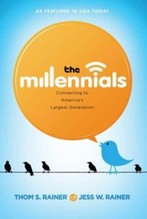 Original Article: News For Christians “I went to a business meeting at that church. I’m never going back.” His name is Kevin. He is a 29-year-old man from Kentucky. Kevin, by his own admission, is not a Christian. “Something made me visit that church,” he told me. “I’m not sure what it was, but I know now it was a big mistake.” Kevin told me how he one day on a whim decided to go to a business meeting in the church he had visited for four weeks. He also told me how he was “blown away” by the petty disagreements and harsh language in the meeting. He was saddened to listen to one man speak in deep anger to someone else. That man was his small group leader. “I felt like I was at a playground fight with six-year olds,” he told us. “Boy did I make a mistake visiting a church.” The Mediating Generation
My son, Jess Rainer, and I did a massive research project interviewing 1,200 Millennials. We shared our research in a book called The Millennials. While the interviews were done by a large team, we did get to speak to many in this generation. And we did look at all the interview results. Keep in mind that this generation is the largest in the history of the United States, almost 80 million in number. They were born between 1980 and 2000. Kevin is one of those Millennials. But this generation is rejecting Christianity in large numbers. They are also rejecting churches in large numbers, particularly divisive and fighting churches. By our estimates based on this research, we approximate that only 15 percent of Millennials are Christians. But many of them are walking away from our churches, and more of them are not attending at all, when they witness or hear about negativity and divisiveness in those churches. They want to see unity among Christians, and they are often disappointed. Do We Compromise Doctrine? The self-evident statement is that we should never compromise our doctrine to try to reach anyone. Interestingly, the Millennials rarely expressed concern about churches and Christians that stayed true to their core convictions. They understood that, though they did not use these words, the atonement, the resurrection, the authority of Scripture, and even the exclusivity of salvation through Christ, are what defines who Christians are. “I would not expect a church to compromise its beliefs to accommodate me,” said Rebecca, a Millennial from Michigan. “To be honest, I am intrigued by their beliefs, and that’s one of the reasons I’m visiting the church.” When Christian Unity Becomes Evangelism The issue for the Millennials was not an expectation of Christians and churches to compromise their doctrine. They simply are attracted to Christians and churches where unity is real and evident. For almost all of the Millennials in our study, 97 percent to be precise, mutual respect was a critical issue in any relationship. And 64 percent of them expressed these feelings strongly, higher than all the other attitudes we measured. It seems, therefore, that Christians and churches will win the right to be heard by Millennials when those Christians and churches demonstrate love and unity among themselves. And the early reporting from the Millennial generation about this issue is not too encouraging. We Christians and the churches we represent may be one of the biggest stumbling blocks to reaching the largest generation in America’s history. Shortly before He went to the cross, Jesus told His followers these words: “I give you a new command: Love one another. Just as I have loved you, you must also love one another. By this all people will know that you are My disciples, if you have love for one another” (John 13:34-35 HCSB). That’s what is important to the Millennials. And more importantly, that is the command of Jesus Himself.
0 Comments
Your comment will be posted after it is approved.
Leave a Reply. |
Get News Updates!Categories
All
Archives
February 2021
|
 RSS Feed
RSS Feed
